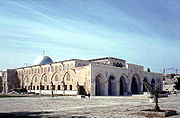Islam is the name of a religion founded by Muhammad in ancient Arabia in the 7th century. People who follow Islam are called Muslims. They believe in only one God, That God is called Allah, which is the Arabic phrase for "the (only) God". There is no plural for Allah in the Arabic language. Muslims believe that Muhammad was the last prophet(or messenger) of God. Muslims read a holy book called the Qur'an, sometimes also spelled "Koran". Muslims also look to other writings, theSunnah and Hadith, as important guides. In Islam there is only one unforgivable sin, that is worshipping another god or giving gods qualities to a person, animal or drawing. As well as having religious laws, Islam has laws on how the government should be run. These laws are called "Shariah Law". Lawyers have looked at Shariah, and interpreted it; these interpretations are called Fiqh. Unlike Christianity and Judaism, Islam was not named after its founder,Muhammad, because Muhammad was not considered "holy." The most holy book in the religion of Islam is the Qur'an. The Qur'an is assumed to be the sayings of Allah. Islam teaches that the Qur'an was revealed by Allah, or God, to Muhammad with the help of an angel called Gabriel. It also teaches that the Qur'an is in heaven and that it is a perfect book. The Qur'an has a total of 114 chapters. In each chapter there are many verses. Many Muslims try to memorize the entire Qur'an and ones that do are generally called upon as Hafiz or Hafez. Other important books are the Sunnah, or biographies of Muhammad and Hadith compilations, which are collections of sayings attributed to Muhammad. There are five things that Muslims should do. They are called "The Five Pillars of Islam". 1. Faith: The Testimony (al-Shahada in Arabic) is the Muslim belief that there is no god but Allah Himself, and that Muhammad is His messenger. 2. Prayer: Muslims pray five times at special times of the day. 3. Charity: Muslims who have money must give alms (Zakah or Zakat in Arabic) to help poor Muslims in the local community . 4. Fasting: Muslims fast during Ramadan, the ninth month of the Islamic year. They do not eat or drink from sunrise till sunset for one lunar month. After Ramadan, there is a holiday called Eid al-Fitr (English: Festival of end-fast). Muslims usually have a party with families and friends and go to the mosque in the morning for a special service. 5. Hajj (Pilgrimage): During the Hajj season, many Muslims go to Makkah, the holiest city of Islam, which is in Saudi Arabia. Muslims must make the hajj at least once in their life if they can afford to do so. There is no need if a Muslim does not have the money to make the Hajj. At the end of Hajj season, there is a holiday called Eid al-Adha (English: Festival of Sacrifice). Muslims in general who can afford or who have made the Hajj must buy an animal, usually a goat, to sacrifice according to Islamic laws and cook as food or give away to the poor, if they have the money for it. Muslims believe that Abraham, one of Allah's earliest messengers, was told by Allah on the day of Eid al-Adha to sacrifice his son in Jerusalem. But the angel Gabriel congratulated Abraham's obedience to Allah and gave him a lamb instead. Place of Worship Muslims, the people who follow the religion of Islam, pray in a holy place called the mosque. Most mosques have at least one dome and some have one or more towers. But a mosque does not need to have a dome or tower. Muslims take their shoes off before entering the mosque to pray. Prayer is one of the most important things that a Muslim does. Like with other religions, over the time different movements have developed in Islam. These movements are based on different interpretations of the scriptures.Qur'an
The Five Pillars of Islam
Different movements and beliefs
Sunni
Shi'a
Kharijite
Sufism
3 Mar 2009
What is ISLAM ?
Subscribe to:
Posts (Atom)

